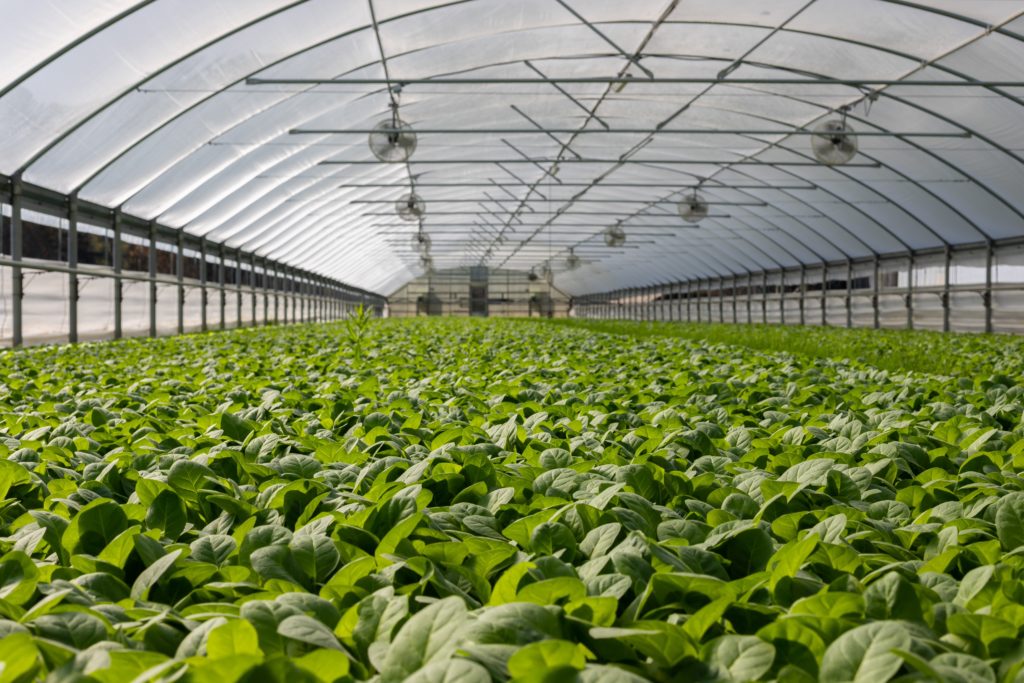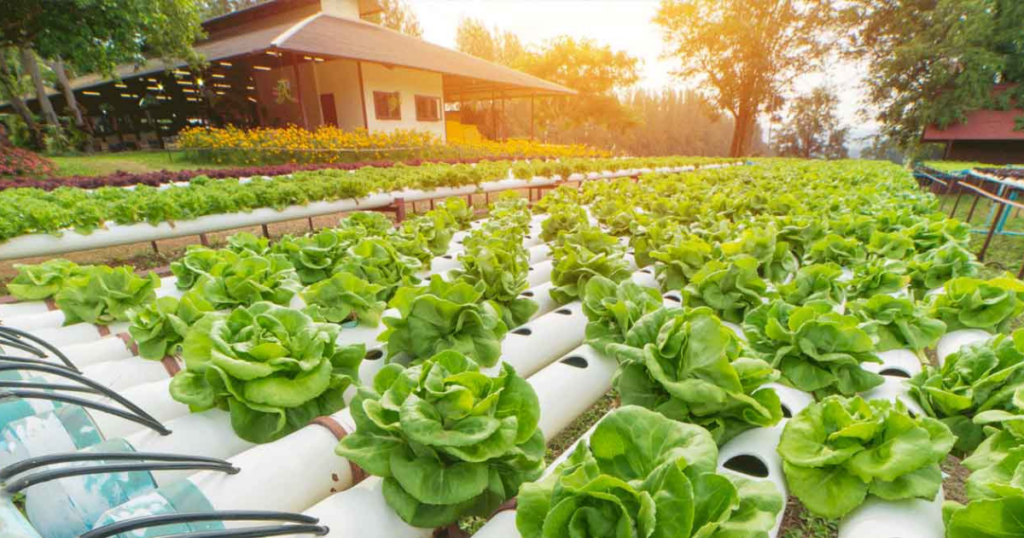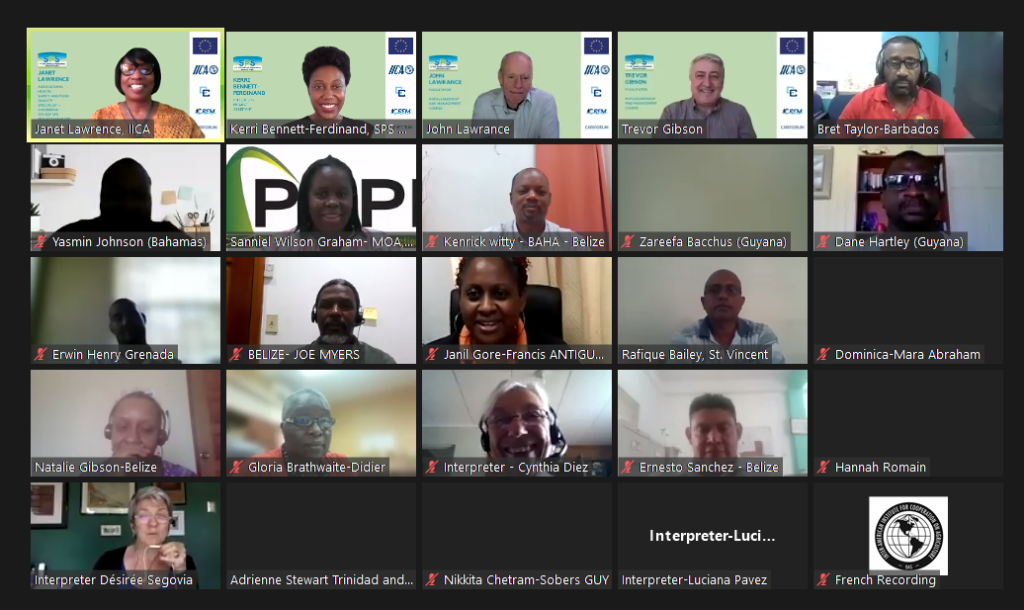Press Release: 11th EDF SPS Project training programme strengthens leadership capacity of more than 30 AHFS managers in CARIFORUM Countries
Bridgetown, Barbados, 24th November 2021 (IICA): Over the past year and a half, disruptions in the global food supply chain due to the COVID-19 pandemic has reinforced the need to build resilience to optimise the functioning of agri-food systems in the CARIFORUM Region. Ana Marisa Cordero, Acting Head, Agricultural Health, Food Safety and Food Quality Program, IICA, explained
“A critical requirement to having an effective and efficient agri-food system which adapts to a changing world and evolving stakeholder requirements is to ensure that we have a cadre of leaders in the Caribbean with the skills to implement significant changes in the field of Sanitary and Phytosanitary Measures.”
On 29th October, more than 30 Agricultural Health and Food Safety (AHFS) senior and middle managers from across fourteen CARIFORUM countries completed an intense eight-module leadership and management programme executed by IICA. Uniquely designed to focus on the Regional AHFS context, case studies and practical examples on leadership, management, communication, and networking were incorporated into the content of the course. This training programme was facilitated by Quincetree Ltd of the United Kingdom under the 11th European Development Fund (EDF) Sanitary and Phytosanitary (SPS) Measures Project. Funded by the European Union, the Project aims to provide support to CARIFORUM Member States in furthering the implementation of their Economic Partnership Agreement (EPA) commitments.

According to Cordero,
“This AHFS Leadership and Management course was yet another important action for strengthening the implementation of the SPS regime across CARIFORUM Countries. Over the past five years, IICA through its AHFS Programme has contributed to the development of a cadre of AHFS leaders in the Caribbean that promotes inter-sectoral discussion and collaboration to strengthen the effective implementation of standards at the national, regional and global levels.”
AHFS professionals attending, learnt new leadership and management methods and concepts which will improve their effectiveness in tackling future challenges. Course participant, Sanniel Wilson-Graham, Chief Plant Quarantine/Produce Inspector at Jamaica’s National Plant Protection Organisation, reflected, “I’ve done a lot of leadership and management courses and I found this programme to be especially relevant as it considered the unique challenges facing AHFS in the Caribbean Region. The facilitators used examples of real issues in the region relating to AHFS, and we considered practical solutions to these challenges. That’s why the course stood out, as I would now be able to apply this knowledge seamlessly to the AHFS space in Jamaica.”

The AHFS leadership and management outlook for Jamaica is optimistic despite ongoing changes such as new legislation in export markets and amendments to trade facilitation agreements. Wilson-Graham stated, “In Jamaica, like other Caribbean countries, there is room for improvement in communicating the AHFS vision and developing strategies to help realise these visions particularly for internal and external customers. The course made me realise that getting buy-in, encouraging collaboration and being able to negotiate are important to ensure that you obtain a balanced perspective from all stakeholders. There must be a political vision, direction, forward planning as well as leadership which considers strategic outcomes at the management level, to achieve this.”
As AHFS in Jamaica is fragmented across different ministries, divisions and departments, Wilson-Graham indicated that one of the key attributes of the programme was its structured approach to understanding how effective AHFS leadership and management can encourage collaboration and help meet national goals, “The course considered political direction, resources needed, and risk management, breaking these down to the operational levels focusing on delegation, negotiation, building your network, and empowering and developing your team.”
Kenrick Witty, Coordinator, Import Regulation Unit at Belize Agricultural Health Authority (BAHA) agreed,
“THERE ARE TIMES WHEN I HAVE TO OVERSEE OUR ENTIRE PLANT HEALTH DEPARTMENT, WHICH IS ABOUT 17 PERSONS COUNTRYWIDE. I HAVE TO KNOW HOW TO LEAD AND MANAGE, AND THIS COURSE HAS GIVEN ME AN ADVANTAGE. IT HAS TAUGHT ME HOW TO CREATE A VISION AND GET THINGS DONE BY LEADING BY EXAMPLE, NOT JUST GIVING ORDERS, THE TRAINERS WERE EXCELLENT IN IMPARTING THESE CONCEPTS. IT WAS ALSO HELPFUL TO LEARN FROM REGIONAL AHFS COLLEAGUES, EXCHANGE VIEWS, AND HEAR THEIR EXPERIENCES.” WITTY SAYS, “THAT IT’S IMPORTANT TO BUILD TRUST WITH THOSE WHO ARE UNDER YOUR DIRECT SUPERVISION AND WITH WHOM YOU COLLABORATE DAILY, TO IMPROVE THE FLOW OF WORK AND REDUCE STRESS.“
In Belize, the AHFS space needs capable leaders and managers who can comply with government policy, contribute to the development of national and regional standards, and represent the country at international AHFS levels. Belize wants to focus on non-traditional exports, increase market access for agriculture, aquaculture, and manufactured goods and invest in research and development in technology such as irrigation, seed production, and pests and disease management. In order to take these initiatives forward, Witty stated, “We need good AHFS succession planning – as managers we have to support and mentor our team members to be in a position to delegate and ensure that we have a smooth transition when persons retire.”

This AHFS leadership and management programme was designed to act as a springboard to stimulate a commitment to continual learning among AHFS professionals in CARIFORUM. As small countries with limited financial resources, Witty’s team is conscious of how this impacts AHFS resources. As a result, course participants from the BAHA recently met to discuss how they can impart this knowledge to other stakeholders. Witty shared the way forward,
“We intend to invite stakeholders from the ministries and departments who collaborate with us regularly such as the Belize Bureau of Standards, the Ministry of Health and the Department of Fisheries and Aquaculture to a training session to share this knowledge. We need to collaborate in order to produce more, export more, and generate more income.”
Witty wants to focus on the importance of effective coordination to achieve BAHA’s mandate, “We need to share data in order to make good decisions that would benefit our countries and the Region – this starts with transparency and consistency in AHFS leadership and management.”



















